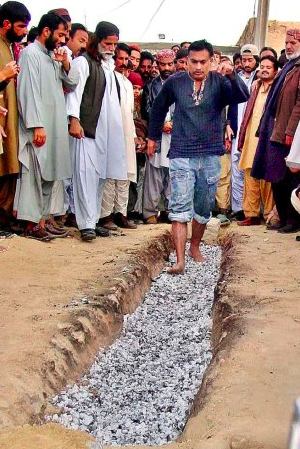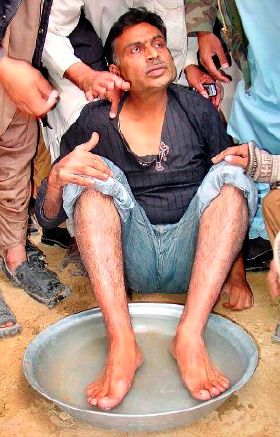 It is not the first time that I’ve heard such news in the past few months. Reportedly, on Jan 19, 2009, a tribal council (jirga) near Quetta asked an accused man to walk on burning coal to prove his innocence.
It is not the first time that I’ve heard such news in the past few months. Reportedly, on Jan 19, 2009, a tribal council (jirga) near Quetta asked an accused man to walk on burning coal to prove his innocence.
The barbarism and insanity of this practice is depicted in the photograph to the right from the Associated Press of Pakistan (APP). The picture is, in fact, of the punishment being carried out. The APP photograph does not have details, but it seems that it relates to this news item in The News (Jan. 20, 2009):
Decades-old practice of walking on burning coal is still alive to this modern age in Balochistan, as a forty-year-old man on Monday walked on burning coal over a property dispute with his brother in Mastung district.
The incident happened in Azizabad, located some 40 kilometres from the provincial capital, where one Nazim Ali walked on burning coal to prove his innocence. Nazim told newsmen afterwards that his brother, living in Quetta, had refused him the right in the property. While Nazim’s brother denied the allegation and claimed to have given Nazim his share. He contacted some tribesmen and at last Nazim Ali was [sic] agreed to walk on burning coal to prove his innocence. If there are burn marks on his feet, the man is considered guilty and a Jirga decides his fate, said a tribesman in Azizabad.
Reports said a 12 feet long, two feet wide and two feet deep trench was dug up, which was filled with dry wood. The wood was burnt for over two hours. As the time to take the test of innocence approached, a veteran walked close to the fire and recited verses from the holy Qura’an. One of the elders told the verses were recited to bring the fire ‘under control’ so that it would not harm the innocent and only burn the guilty. Hundreds of people, including friends and relatives of the accused, stood around the burning coal when the accused took a walk on burning coal. He was immediately taken to a bucket filled with the blood of a slaughtered goat and dipped his feet in it.
“If there were burn marks on his feet, the man is considered guilty and Jirga decides further course of action against him. If his feet remain safe, he will be declared innocent,†another tribesman Muhammad Saleem said.
The incident was witnessed by hundreds of people and widely reported in the media. The time to decide whether the accused was innocent or guilty will be decided on Tuesday at a news conference, an elder of the Jirga told The News.
 The photographs are obviously disturbing, but even more disturbing is the fact that this could happen today. In my opinion, while mediation can be done by anyone, justice and physical punishments should only be given through Government appointed courts. I think this photo here is yet another form of vigilante style justice and it challenges the writ of the Government.
The photographs are obviously disturbing, but even more disturbing is the fact that this could happen today. In my opinion, while mediation can be done by anyone, justice and physical punishments should only be given through Government appointed courts. I think this photo here is yet another form of vigilante style justice and it challenges the writ of the Government.
Photo to the left is after this guy completed his walk on burning coals (although it looks like the feet are dipped in water, not goat’s blood).
I find both of these photos, and more importantly the act that these photographs record, to be not just shocking but inhuman. As we have said at Pakistaniat many times before, obvious Jahalat and inhumanity can never be justified in the name of tradition or culture (here, here and here). No matter how old or deep the tradition might be!
Photo Credits: Mohsin Naseer of Associated Press of Pakistan. Clicking on photos above will take you to their parent website and larger image sizes.




















































Why do you have to always highlight these negative stories about Pakistan?
This happens only in few remote places and not all over Pakistan. And this has nothing to do with Islam.
Hope education spreads throughout the subcontinent so it becomes free from such superstitions. I think law-and-order isn’t the problem, it’s superstition that makes people and village councils believe such stuff – that walking on coal without burn marks proves your innocence or guilt.
Frankly, I am still reeling just reading these horrendous reports. I think those who would just stand there and watch these also need to be punished. And certainly it is most shameful that the provincial Minister for HUMAN RIGHTS seems to be defending this practice. Just how jahil does one have to be to become a Minister today!
P.S. I am also torn about what the role of a good journalist should be in such a situation? (By the way, part of the new The News story seems to be just lifted from the earlier Daily Times story (even though the two are by different authors; Muhammad Ejaz Khan and Malik Siraj Akbar, respectively.).
This is just pure inhumanity. And as you say, this is not the only recent incident. Just two weeks ago there was a long story in Daily Times about how this practice is growing (or at least being reported more).
The report also mentioned that Charbeli, “practice of forcing alleged criminals to walk on burning coal is locally known, appears to supersede the criminal justice system and the state
So Sad! – Heart filled with sorrow after reading this blog post, Owais Mughal shb i must appreciate your effort to point our such violence happening in our country.
But its main reason is that government cannot influence its own low-n-order in such tribal areas as they people claim to be the owner of these areas. to enforce Pakistan’s law in those areas government and army will have to struggle so much. But because we dont know what exactly was the thing that caused this person to be punished this way… we cannot say anything. Might be this man were a victim of some serious crime – that seniors of his tribe thought this punishment the right one for him.
Secondly Owais sahab I must appreciate your way of writing, I really like your style. So Nice.